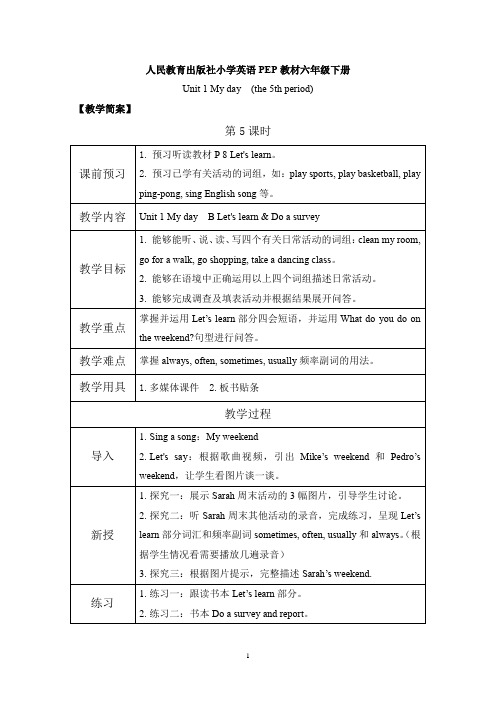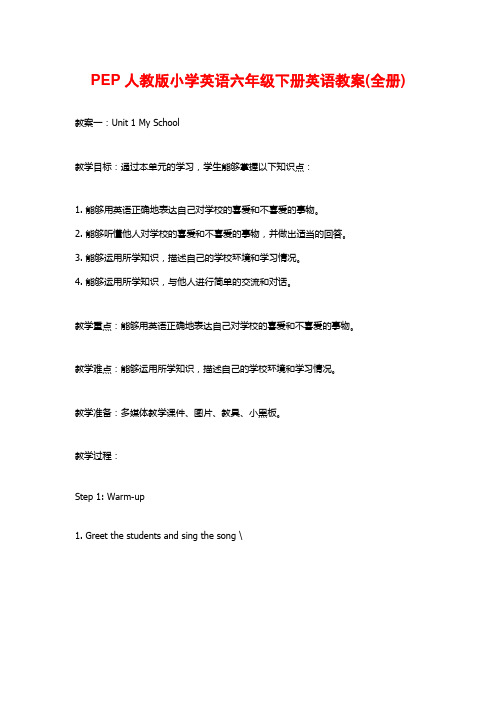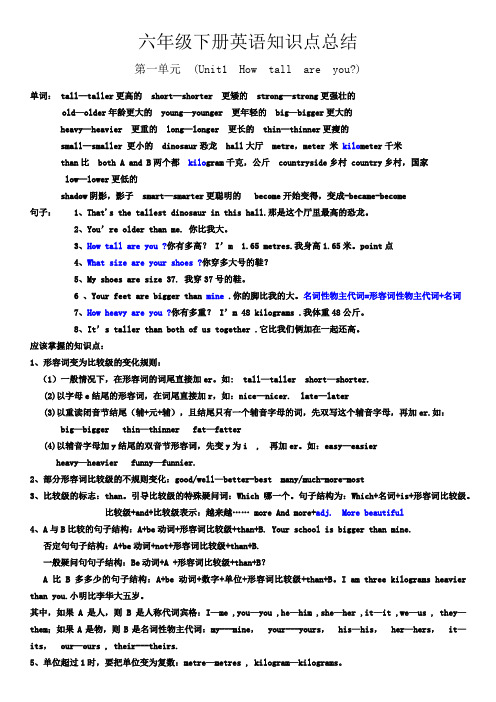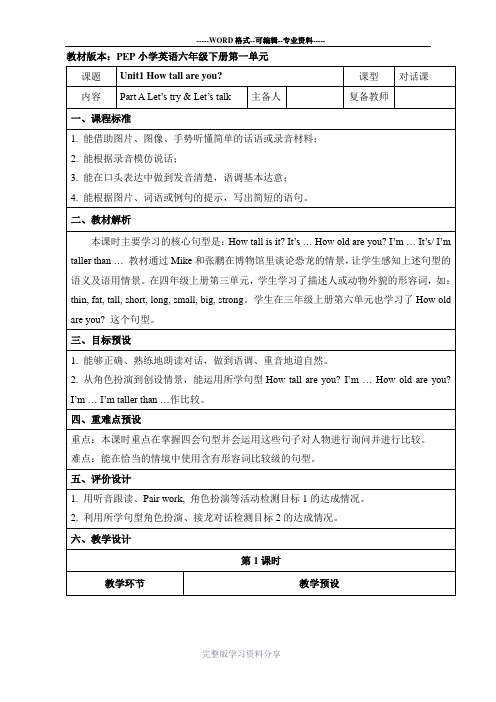PEP小学英语六年级下册 unit
人民教育出版社小学英语PEP教材六年级下册

人民教育出版社小学英语PEP教材六年级下册Unit 1 My day (the 5th period)【教学简案】第5课时【教学详案】课前预习:1.预习听读教材P 8 Let's learn。
2.预习已学有关活动的词组,如:play sports, play basketball, play ping-pong, sing English song等。
教学内容:Unit 1 My day B Let's learn & Do a survey教学目标:1. 能够能听、说、读、写四个有关日常活动的词组:clean my room, go for a walk, go shopping, take a dancing class。
2. 能够在语境中正确运用以上四个词组描述日常活动。
3. 能够完成调查及填表活动并根据结果展开问答。
教学重点:掌握并运用Let’s learn部分四会短语,并运用What do you do on the weekend?句型进行问答。
教学难点:掌握always, often, sometimes, usually频率副词的用法。
教学用具:1.多媒体课件 2. 板书贴条教学过程:一、Warming up1. Sing a song:My weekend2. Let’s say:根据歌曲视频,引出Mike’s weekend和Pedro’s weekend,让学生看图片谈一谈。
T: In the video, we sang about Pedro and Mike’s weekend. Look at this picture. If you are Mike, can you talk about his weekend?S: I often clean my room on the weekend. (板书often)S: I sometimes go shopping on the weekend. (板书sometimes)T: What about Pedro’s weekend?(指着Pedro的图片提问)S: I usually play football and play basketball on the weekend.(板书usually)T: Right. We can also say Pedro usually plays sports on the weekend.设计意图:歌曲活跃课堂气氛,营造轻松学习氛围,吸引学生的注意力,为学生学习课文词组和语言表达做铺垫;以歌曲中人物活动作为引子,帮助学生回顾所唱的内容,为后面学习相关周末活动做铺垫;其次,运用图片中的星级标注引出3个频率副词,将抽象内容具体化,有助于学生对虚词的理解。
PEP英语六年级下册 Unit 1单元知识梳理

新版PEP六年级英语下册Unit 1知识点归纳一、必背词汇tall ------ taller 高的----更高的dinosaur 恐龙short ------ shorter 矮的/短的----更矮的/更短的hall 大厅long ------ longer 长的----更长的than 比strong------ stronger 强壮的----更强壮的both 两个都old ------ older 老的/旧的----更老的/更旧的meter 米形容词young------ younger 年轻的----更年轻的kilogram千克;公斤adj. small------ small 小的----更小的others size 号码thin ------ thinner 瘦的----更瘦的feet 脚heavy------heavier 重点----更重的wear 穿low------ lower 低地----更低地countryside乡村smart------smarter 聪明的----更聪明的shadow 影子;阴影become变成;开始变得辅+元+辅--------双写最后一个辅音字母+er辅音字母+y -----改y为i +erbig-----bigger 大的-----更大的happy-----happier 开心的-----更开心的thin-----thinner 瘦的-----更瘦的heavy-----heavier 重的------更重的fat-----fatter 胖的------更胖的funny-----funnier 滑稽的------更滑稽的二、重点句型⑴问年龄,身高,体重等How old are you? How tall are you? How heavy are you?---- I’m _______ (years old). ---- I’m ______metres tall. ---- I’m ______ kilograms .⑵问物品的情况:① How large is your room? 你的房间有多大?It’s __________ m2 (square meters.) 有_______ 平方米。
PEP人教版小学英语六年级下册英语教案(全册)

PEP人教版小学英语六年级下册英语教案(全册) 教案一:Unit 1 My School
教学目标:通过本单元的学习,学生能够掌握以下知识点:
1. 能够用英语正确地表达自己对学校的喜爱和不喜爱的事物。
2. 能够听懂他人对学校的喜爱和不喜爱的事物,并做出适当的回答。
3. 能够运用所学知识,描述自己的学校环境和学习情况。
4. 能够运用所学知识,与他人进行简单的交流和对话。
教学重点:能够用英语正确地表达自己对学校的喜爱和不喜爱的事物。
教学难点:能够运用所学知识,描述自己的学校环境和学习情况。
教学准备:多媒体教学课件、图片、教具、小黑板。
教学过程:
Step 1: Warm-up
1. Greet the students and sing the song \。
PEP六年级英语下册Unit-3-PartA-Let’s-try课件精选全文

Mt.Tianshan
Turpan
Listen and answer
➢ Where did John go over his holiday? He went to Mt. Tianshan and Turpan in Xinjiang.
➢ What did he do there? He rode a horse and saw lots of grapes.
photos from the Labour Day holiday.
Listen, read and imitate
Amy: Where did you go? John: Mt. Tianshan, Xinjiang. I rode a horse.
Look, it’s very small! Amy: Oh, yes. It looks like a mule! Did you go
sorry I can’t come. Amy: OK. Bye.
What happened? I hurt my foot.
What happened? I had a cold.
John hurt his foot. He didn’t go to school. Did Amy go to John’s home? What happend to John?
1. Where is John now?
He is at the hospital.
2. Where is Amy now?
She is at school.
3. Why did Amy give a phone call to John?
Because John didn’t come to school.
PEP版小学英语六年级下册第一单元单词表

精品教案设计资料PEP版小学英语六年级下册第一单元单词表PEP?unit 1 younger 鏇村勾杞荤殑銆?young鐨勬瘮杈冪骇锛?/ 'jQNgE/ ['j蕦艐锟斤拷蓹] older 鏇村勾闀跨殑銆傦紙old鐨勬瘮杈冪骇锛?EuldE ['蓹蕣ld蓹] taller 鏇撮珮鐨勩€傦紙tall鐨勬瘮杈冪骇锛?tR:lE ['t蓴:l蓹(r)] shorter 鏇寸煯鐨勶紱鏇寸煭鐨勩€傦紙short鐨勬瘮杈冪骇锛?/ 'FR:tE/ [蕛蓴rt蓺] longer 鏇撮暱鐨勩€傦紙long鐨勬瘮杈冪骇锛?lRNgE ['l蓲艐锟斤拷蓹] thinner 鏇寸槮鐨勩€傦紙thin 鐨勬瘮杈冪骇锛?/ 'WinE/ ['胃瑟n蓹] heavier 鏇撮噸鐨勩€傦紙heavy鐨勬瘮杈冪骇锛?'heviE ['hev瑟蓹] bigger 鏇村ぇ鐨勩€傦紙big鐨勬瘮杈冪骇锛?bigE [b 瑟g蓹(r)] smaller 鏇村皬鐨勩€傦紙small鐨勬瘮杈冪骇锛?smR:lE [sm蓴:l蓹(r)] stronger strong鐨勬瘮杈冪骇锛?strRNE [str蓲艐蓹(r)] dinosaur 鎭愰緳/ 'dainEsR:/ ['da瑟n蓹s蓴藧] hall 澶у巺/ hR:l/ [h蓴藧l] metre eter锛?/ 'mi:tE/ ['mi藧t蓹] than 姣?/ TAn/ [冒忙n; 冒(蓹)n] both 涓や釜閮?/ bEuW/ [b蓹蕣胃] kilogram 鍗冨厠, / 'kilEgrAm/ [藞k瑟l蓹锟斤拷r忙m] countryside 涔℃潙/ 'kQntrisaid/ ['k蕦ntr 瑟sa瑟d] lower 鏇翠綆鍦般€?low浣? / 'lEuE/ ['l蓹蕣蓹] shadow 闃村奖锛涘奖瀛?/ 'FAdEu/ ['蕛忙d蓹蕣] smarter 鏇磋仾鏄庣殑銆傦紙smart鐨勬瘮杈冪骇锛?sma:tE ['sm锟斤拷:t蓹] become 寮€濮嬪彉寰楋紱鍙樻垚/ bi'kQm/ [b瑟'k 蕦m]。
新版PEP小学六年级英语下册Unit-4-Then-and-now教案

Unit 4 Then and now教学目标知识与能力目标1. 能够听、说、读、写,并在情景中恰当运用句型以及相关词汇:There was/ were (no) … years ago. Now there is / are ..谈论或描述某个地方的今昔。
2. 能够听、说、读、写,并在情景中运用以下句型以及相关词汇:Before, I / he/ she / it / was… Now , I / he / she / it ……谈论或描述自己、家人以及朋友过去到现在的变化。
3. 能够在语境中理解生词或短语star, easy, look up , Internet 的意思,并能正确发音。
情感态度、文化意识、学习策略目标1.鼓励学生将自己的烦恼、恐惧讲述给父母,释放内心的压力,保持身心健康。
2.能够在语篇中捕捉不同类型的信息,提炼文章的主旨大意,并进行简单的推理。
3.学会上网查询资料,自主学习。
课时安排6课时第一课时教学内容A.Let’s try Let’s talk课型对话教学教学目标1.学生能理解对话大意并能正确朗读所学对话。
2.能在图片的帮助下,在情景中运用There be 句型,用3—5句话描述某个地方过去与现在的状态和变化。
3.能理解one day , look it up, in my time , Internet 的意义和用法,并能正确发音。
4.了解为类首次登月的一些信息。
教学重点能在图片的帮助下,在情景中运用There be 句型,用3—5句话描述某个地方过去与现在的状态和变化。
教学难点能理解one day , look it up, in my time , Internet 的意义和用法,并能正确发音。
教学准备课件、图片教学过程:Step 1: Warm-up1.教师出示图片,复习学校设施单词如:library, computer room, art room……2.教师将单词卡片发给学生,模拟“萝卜蹲”游戏。
pep六年级英语下册知识点总结

六年级下册英语知识点总结第一单元(Unit1 How tall are you?)单词: tall—taller更高的short—shorter 更矮的strong—strong更强壮的old—older年龄更大的young—younger 更年轻的big—bigger更大的heavy—heavier 更重的long—longer 更长的thin—thinner更瘦的small—smaller 更小的 dinosaur恐龙 hall大厅 metre,meter 米kilo meter千米than比 both A and B两个都 kilo gram千克,公斤 countryside乡村 country乡村,国家low—lower更低的shadow阴影,影子 smart—smarter更聪明的 become开始变得,变成-became-become句子: 1、That's the tallest dinosaur in this hall.那是这个厅里最高的恐龙。
2、You’re older than me. 你比我大。
3、How tall are you ?你有多高? I’m 1.65 metres.我身高1.65米。
point点4、What size are your shoes ?你穿多大号的鞋?5、My shoes are size 37. 我穿37号的鞋。
6 、Your feet are bigger than mine .你的脚比我的大。
名词性物主代词=形容词性物主代词+名词7、How heavy are you ?你有多重? I’m 48 kilograms .我体重48公斤。
8、It’s taller than both of us together .它比我们俩加在一起还高。
应该掌握的知识点:1、形容词变为比较级的变化规则:(1)一般情况下,在形容词的词尾直接加er。
如: tall—taller short—shorter.(2)以字母e结尾的形容词,在词尾直接加r,如:nice—nicer. late—later(3)以重读闭音节结尾(辅+元+辅),且结尾只有一个辅音字母的词,先双写这个辅音字母,再加er.如:big—bigger thin—thinner fat—fatter(4)以辅音字母加y结尾的双音节形容词,先变y为i , 再加er。
人教PEP版六年级英语下册《Unit1-A-Let’s-talk名师教案》

3.核对答案,呈现一高一矮两只恐龙的图片,并提问:Can you guess which one is the second dinosaur? Yes, because this one is taller.帮助学生理解taller的含义。
Let’s talk
1.课件呈现博物馆图片,引导学生用It’s tall/strong …描述图中的恐龙,复习巩固已学形容词。
难点:能在恰当的情境中使用含有形容词比较级的句型。
五、评价设计
1.用听音跟读、Pair work,角色扮演等活动检测成情况。
六、教学设计
第1课时
教学环节
教学预设
热身/复习(Warm-up/Revision)
1. Sing a song: “At the zoo”.
采访你的同学,询问他的身高和年龄,与你作比较,并将你们的对话写下来,不少于4句话。
七、板书设计:
Unit1 How tall are you?
dinosaur, hall, metre, than, taller, tallest
That’s the tallest dinosaur in this hall.
2. Group work
根据实际情况,完成课文下面的填空,并展示。
(先将自己的信息补充完整,然后在小组内询问并找到比自己高、比自己大的同学,将句子写在问句后的横线上,最后在组内展示。)
3.打开U1 A Let’s talk课堂基础练/拔高练,即学即练,检测当堂学习情况。
小结
(Summary)
1.Read the talk together.
作业设计
(Homework)
- 1、下载文档前请自行甄别文档内容的完整性,平台不提供额外的编辑、内容补充、找答案等附加服务。
- 2、"仅部分预览"的文档,不可在线预览部分如存在完整性等问题,可反馈申请退款(可完整预览的文档不适用该条件!)。
- 3、如文档侵犯您的权益,请联系客服反馈,我们会尽快为您处理(人工客服工作时间:9:00-18:30)。
He feels a__n_g_r_y_.
How does he feel?
Wake up!!
She's __t_ir_e_d___.
How does he feel?
I don't know what to do.
He's b__o_r_e_d_.
• get (have) the flu 得流感 • Don't worry. 不要担心。
• see the (a) doctor 看医生
• take some medicine 吃药
• drink htay in bed for a few days.
卧病在床一些天。
1. How do the students feel before the football game starts?
_____T__h_e_y__f_e_e_l__e_x_c_i_t_e_d_.____________
2.How does John feel when the ball hits his head?
• You will feel better soon.
很快你就会感觉好一点的。
Section B Let's learn
How does he feel?
I fail my English test.
I'm in the blue.
He's _s_a_d_.
(He feels)
How does he feel?
My legs hurt.
hurt
[hə:t]
What's the matter?
I feel sick.
I have a headache.
headache
['hedeik]
What's the matter?
I feel sick.
I have a toothache.
toothach e ['tu:θeik]
angry... • - Not bad! 还不错。 • - So-so. 一般般。 • - Better than ever.
好得不能再好了。
How do I look today? You look_______.
Let's talk
Sarah: How are you,Liu Yun? You look so happy.
_____H__e__is__a__l_it_t_l_e_a__n_g_r_y_.___________
3. How does Class 3 feel at the end of the game?
_T_h__e_y__a_r_e__n_o__t _s_a_d__._T_h_e_y_'r_e_la_u_g_h_i_n_g_a_t_
nose hurts.
Have the flu
What do you do if you get the
flu?
see the(a) doctor take some medicine
What do you do if you get the
flu?
drink hot water stay in bed
What a bad day !
go to see a doctor
What's the matter?
I feel sick. I have a fever.
fever
['fi:və]
What's the matter?
I feel sick. I have a cold.
What's the matter?
(He feels)
How does he feel?
So... much money!
He feelse_x__c_i_t_e_d_.
How does he\she feel?
• John failed his math test. He
looks__s_a_d__.
• Liu Yun is going on a trip with parents.
What's the matter?
I have a sore throat.
throat
[θrəut]
have a toothache
have a fever
have a cold
have a headache
Let's talk
• Doctor: How do you feel? • Amy: I feel sick. • Doctor: What's the matter? • Amy: My throat is sore. My
Peng is __b_o_r_e_d.
• The ball flies into Wu Yifan's face, he is
a little a__n_g_r_y_.
-How are you?
• - I'm fine\ great \wonderful... • - I feel sad\ happy\ excited\
She is _e_x_c__it_e_d.
• Sarah's mom is going to buy her a new
skirt. She looks__h_a__p_p_y.
• Mike didn't sleep well last night. He
looks_t_i_r_e_d_.
• The football match is boring, so Zhang
Liu: Yes. I am excited. I am going on a big trip. How are you, Sarah? You look sad today.
Sarah: I failed the math test. Liu: I'm sorry to hear that.
Let's read
• How are you feeling? • Fine. How are you ? • I have a headache. • I have the flu. • How are you feeling? • Fine. How are you? • I'm feeling better. • I'm as good as new.
